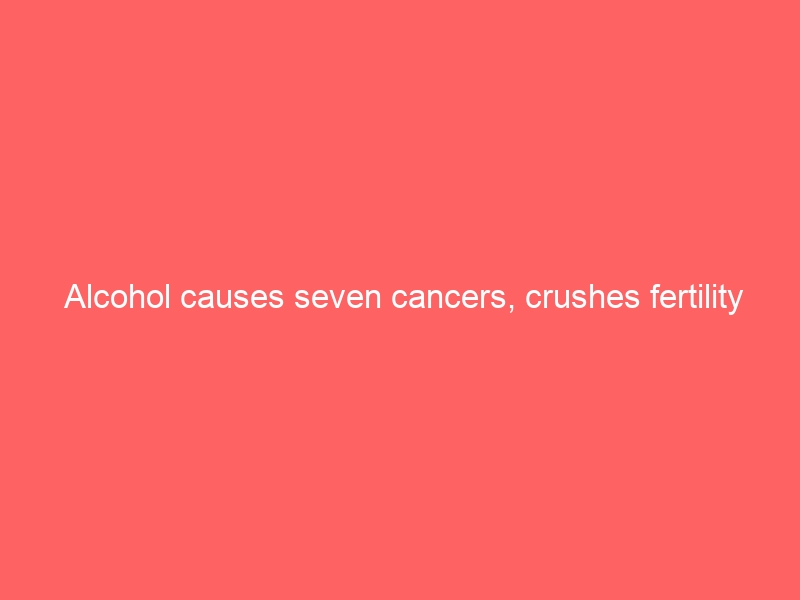•The American Society for Clinical Oncology put out its first official warning on alcohol and cancer yesterday
•Drinking even moderate amounts of alcohol is not only linked to but is a cause for seven cancers including mouth, throat, breast and colorectal cancers
•The report comes as more Americans are drinking more alcohol than in the past
•Alcohol causes more than five percent of cancers and cancer deaths
•The report advises that drinking one or less drinks a day for women and two or less drinks a day for men greatly reduces the development of these cancers
The more alcohol you drink, the more likely you are to develop at least seven types of cancer, oncologists warned in a statement released yesterday.
Drinking – even small or moderate amounts – was especially closely associated with increased risks for esophogeal, mouth, liver, colorectal and breast cancers, and is responsible for more than five percent of cancers and cancer deaths worldwide.
The American Society of Clinical Oncology (ASCO) has never before formally addressed the link between alcohol and cancer, but is now underscoring the importance of controlling ‘high-risk’ alcohol consumption to reducing the risk of cancer.
While the ASCO does suggest strategies for cutting back on drinking, it also advocates for temperate use of alcohol, rather than recommending Americans give up drinking altogether.
As of 2013, about 73 percent of Americans reported consuming alcohol, and nearly 13 percent described their consumption habits as binge drinking, according to a survey published in JAMA Psychiatry in August.
The survey found that alcohol consumption had soared since 2001-2002. Drinking in general was up by 11 percent, high-risk drinking was 30 percent more common and 50 percent more people qualified as having a drinking problem.Meanwhile, including isoflavones in the diet has been linked to a greater risk of advanced prostate cancer.
Soy is often hailed for its health benefits. But for men, eating soy and other foods rich in isoflavones may not be so favorable; it could increase the risk of advanced prostate cancer.However, when it comes to the risk of non-advanced prostate cancer — that is, cancer that has not spread beyond the prostate gland — dietary isoflavones appear to have no significant influence.
These are the findings of a new study recently published in the International Journal of Cancer.Prostate cancer is the most common cancer among men in the United States, after skin cancer.
Studies have suggested that diet can affect a man’s risk of prostate cancer. Last year, for example, Medical News Today reported on a study that linked a regular intake of processed carbohydrates to a greater likelihood of prostate cancer, while other research has associated a high-fat diet with the disease.
The new study — which was conducted by senior author Dr. Jianjun Zhang, of the Fairbanks School of Public Health at Indiana University in Indianapolis, and colleagues — suggests that including isoflavones in the diet may also influence the risk of prostate cancer.Isoflavones are a type of phytoestrogen, which are plant-derived compounds that have similar effects on the body as the female sex hormone estrogen.
Soy and soy products — such as miso, tempeh, and tofu — contain the highest concentrations of isoflavones. Other dietary sources include kudzu root and potato beans.Studies have shown that isoflavones may have varying effects on health. Some have indicated that the compounds may drive breast cancer, while others have suggested that they could benefit some women with breast cancer.
Low testosterone may be associated with a lower risk of prostate cancer, say researchers.To find out whether dietary or not isoflavones influence the risk of prostate cancer, Dr. Zhang and colleagues analyzed the data of 27, 004 men who were part of the Prostate, Lung, Colorectal, and Ovarian Cancer Screening Trial.The team identified 2,598 prostate cancer cases among the men over a median follow-up period of 11.5 years. Of these cases, 287 were advanced prostate cancer.
As part of the trial, the men completed food frequency questionnaires. The researchers used data from these questionnaires to assess the men’s intake of foods rich in isoflavones.Compared with men who did not have isoflavones in their diet, those who did were found to be at greater risk of developing advanced prostate cancer, or cancer that has spread from the prostate gland to distant sites.
The researchers found no significant link between dietary isoflavones and the risk of non-advanced prostate cancer.As a result of their findings, Dr. Zhang and team believe that including isoflavones in the diet may affect men’s risk of prostate cancer, though further studies are warranted.Also, abstaining from alcohol during preconception and pregnancy is usually considered to be the woman’s responsibility.
The main concern surrounding alcohol exposure during pregnancy often relates to well-established evidence of newborns developing a range of behavioural, physical and cognitive disabilities later in life.But recent research is also pointing to a link between alcohol and poor sperm development, meaning the onus is on expectant fathers too. A myriad of studies are showing biological fathers who drink alcohol may have a significant role in causing health problems in their children.
Studies are showing paternal alcohol consumption has negative effects at all levels of the male reproductive system. This is as well as altered neurological, behavioural and biochemical outcomes in subsequent generations.
Data has shown males are twice more likely than females to consume more than two standard drinks per day on average over a 12-month period (24 percent compared with 9.8 percent). And about a third of males said they exceeded the guideline not to drink more than five standard drinks on a single occasion on a monthly basis.
These figures are alarming given the compelling evidence about the impact of excessive, chronic or binge alcohol consumption on sperm, semen quality, fertility and child health.Animal studies have shown a single dose of ethanol into the stomach lining (equivalent to a human binge drinking) induces damage to the testis, damaging the cells essential for sperm formation.
In another experimental study, sperm health and fertility was assessed in male rats after administration of alcohol into the stomach for ten weeks. The results confirmed alcohol significantly reduced sperm concentration and the ability of the sperm to move properly. And none of the rats exposed to alcohol fertilised the females, despite confirmation of successful mating.
A myriad of other non-human studies have also shown similar results, suggesting ethanol has the ability to damage sperm and fertility.Studies in humans have also supported these findings. A recent study of 1,221 young Danish men (18-28 years of age) tracked alcohol consumption in the week preceding the study to determine its effects on semen quality (volume, concentration, total count, and shape).
The results showed sperm concentration, total sperm count and percentage of sperm with normal shape got worse the more the men drank. This association was observed in men reporting at least five units of alcohol in a typical week, but was most pronounced for men with a typical intake of more than 25 units a week. This suggests even modest habitual alcohol consumption of more than five units a week can negatively affect semen quality.
A recent review of studies and meta-analysis of population data replicated many of these findings. The main results showed daily alcohol intake at moderate to high levels had a detrimental effect on semen volume and normal shape.
The United States Centers for Disease Control (CDC) recommends that women have no more than one drink a day or eight drinks a week. Men drink two drinks a day, or 14 a week. But data suggests that many Americans are drinking far more than what they should.ASCO cited a review that found ‘the evidence to be convincing’ that alcohol consumption is not just linked to be is a cause of mouth, throat, voice box, colorectal, liver and breast cancer.
The report said that there is also now enough evidence to suggest that alcohol is a probably cause of pancreatic, stomach and other cancers. Meanwhile, limited studies have tracked the drinking patterns of fathers around the time of conception and subsequent health outcomes of the child. But rodent models have shown changes in offspring weight and development, learning and activity, anxiety related behaviours and molecular and physiological effects.
A study also reported the women whose partners consumed ten or more drinks per week prior to conception had two to five times increased risk of miscarriage compared to those whose partners did not drink during preconception.
Other studies provide some preliminary evidence that paternal preconception alcohol use is associated with acute leukemia at high-level use, heart malformation with daily use, microcephaly with low to moderate use, and effects in relation to fetal growth and mild cognitive impairments.
The exact mechanism of how alcohol alters developing sperm and the later health outcomes of the foetus is still not yet fully understood. It’s been suggested alcohol can change the micro-environment within the testes, altering the development and maturation of the sperm.
It’s also been suggested alcohol can influence sperm by creating genetic alterations and epigenetic marks. This means changes to gene expression occur without changes to the underlying DNA sequence.
These epigenetic marks can be transferred at the time of fertilisation. This can subsequently alter the molecular makeup of the early embryo, leading to alterations in foetal development and the potential to impair offspring health.The biggest hurdle for researchers now is continuing to translate findings from the basic sciences to more sophisticated research in humans. The next stage is to identify patterns of alcohol use by men during the preconception period on foetal and childhood outcomes in the Australian context.
But most importantly we need to realise decisions about alcohol use during the preconception period are not the sole responsibility of women. We need to be talking to men about these issues to ensure healthy outcomes for the baby.












